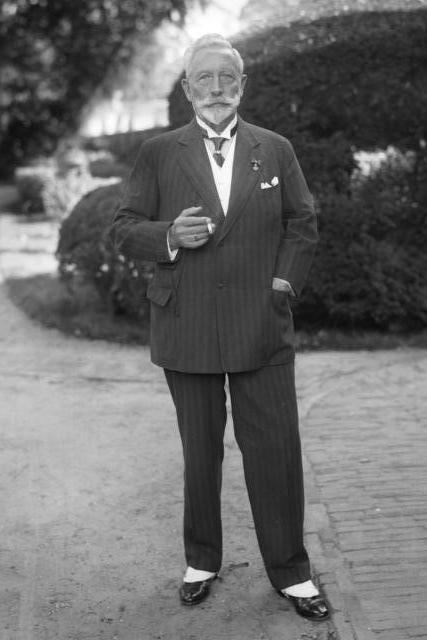Review: The Ex Kaiser in Exile May 20, 2014
Author: Beach Combing | in : Contemporary , trackbackIn 1918 as Germany began to implode, Wilhelm II, Kaiser and perhaps the individual most responsible for the war, crossed the border into the Netherlands, took up residence there and then abdicated. He would live in the Netherlands (which had of course been neutral for the previous four years) until his death in 1941. In 1920 Lady Norah Bentinck wrote a curious book that has sunk almost without trace: The Ex Kaiser in Exile. This work described her frequent visits to the aristocratic circle in the Netherlands where Wilhelm II lived out the rest of his life. Most Britons at this date, male or female, would have spat on the ground the Kaiser walked upon or, had they been of LNB’s social class, said something cutting and then flounced out of the room.
LNB was, however, a rather unusual woman. She combined the natural Edwardian patriotism of her class, with an attractive cosmopolitanism and she seems to have made an attempt to understand the ex royal, notwithstanding the fact that the British general election of 1918 had included the slogan: ‘hang the Kaiser!’ The result is, make no mistake, a chaotic book – LNB does wander off into stories about minor aristocratic lineages at the slightest provocation – though otherwise ‘lineal’ is not in her vocabulary. But she also gives a unique and a surprisingly sympathetic view of the ‘lost king’.
Perhaps the most forceful thing to come out of the book is that aristocrats of every European county were united by ties that were stronger than any ties with their fellow nationals in other classes. (Something brought out memorably in that stupendous French film, the Grand Illusion, 1937 with de Boeldieu dancing on the battlements). Wilhelm II had these links in his DNA, of course. His mother after all had been British and the first thing he asked for when ensconced in his new home in Holland was ‘a cup of real good English tea’: he also enjoyed the shortbread made by a resident Scottish cook.
But these links created hopelessly crossed loyalties. The Kaiser had found refuge with the Bentinck family who because of connections with Britain had seen two family members (on the other side of the Channel) die in the Great War. Wilhelm, in fact, had that confused view of Britain, found in a diluted form in Hitler, where admiration and hate vyed constantly for dominance. He talked in his Dutch exile of his love of the ‘Tommies’ (who apparently had cleaner trenches than the French). He also resented the hatred that poured out of the UK towards his ex-royal person: ‘Why do they hate me so? Why do you English hate me so?’
Well, Wilhelm let Beach count the ways.
When I started reading this book I fantasized about making it into a novel. One of the most powerful men in the world reduced to a circus side show in an obscure province of a country not his own. But I changed my mind by the time I was half way through. Wilhelm had the flaw of unknowing mediocrity. He was below average but refused to accept this and constantly overstretched himself. Compare him to knowing mediocrities, who often make good monarchs, protected by institutions and traditions and their own self knowledge, e.g. Elizabeth II.
The problem is that Wilhelm did not change either in or out of power. He certainly faced his exile and his wife’s death with courage, but these were, to be frank, class reflexes. He never really came to terms with what had happened to him: he descended, instead, into race politics (his longstanding views on the ‘yellow peril’ preceded the Great War but grew still more pronounced afterwards), low grade anti-semitism (fuelled by the Protocols) and anti-free-masonry (with lashings of nonsense about the Jesuits and the illuminati): in short, a second-rate man with a second rate and self indulgent mind. There is no Philip II moment, when the Spanish warlord realises the Armada has been a foolish mistake and repents.
The great drama at the end of W’s life, one that falls far outside the limits of LNB’s book, not that shrewd Lady Nora would have been surprised, was the German invasion of Holland in 1940. Here Wilhelm showed his true colours and wrote a telegram to Hitler asking for the restoration of the monarchy. He hadn’t been reading eight German newspapers a day for nothing. Or perhaps he had because Hitler declined to reply and called Willhelm an idiot. Too bad Wilhelm didn’t live just five more years to see the end of the iron dream on the Elbe and the Rhine.



